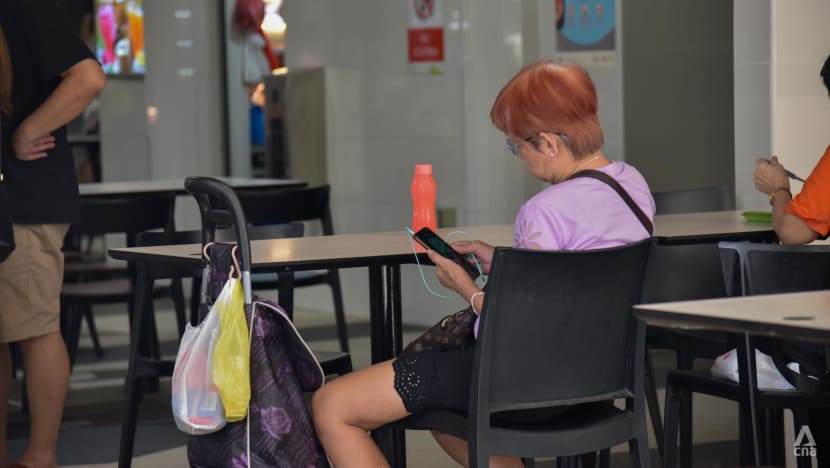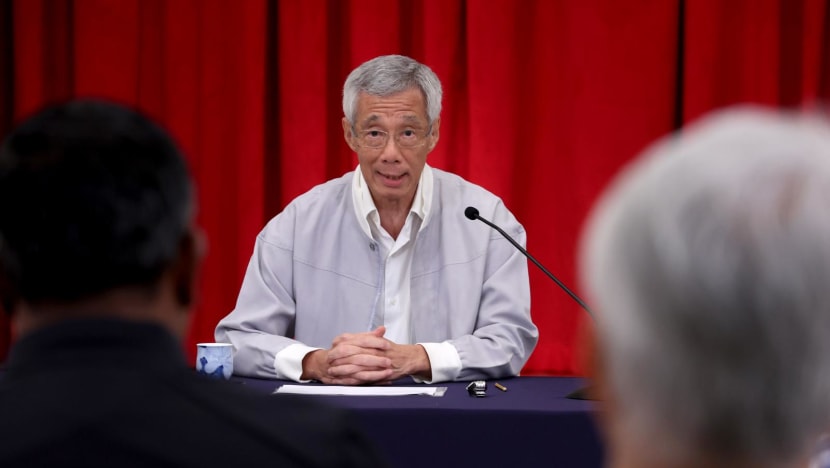
Commentary: Loneliness is an overlooked public health challenge in ageing Singapore
Countries like Singapore place an emphasis on self-reliance, making it difficult for individuals to acknowledge their loneliness and seek support, say researchers from Centre for Ageing Research & Education, Duke-NUS Medical School.

SINGAPORE: Leaders worldwide are drawing attention to an epidemic of loneliness. United States Surgeon General Vivek Murthy recently highlighted it as an "underappreciated public health crisis that has harmed individual and societal health” in the US.
In Singapore, loneliness is a major concern in Singapore for all ages, but particularly for older persons. In a 2015 study conducted by Centre for Ageing Research and Education (CARE) at Duke-NUS Medical School, we found that being lonely increased an older person’s risk of dying by 7 per cent when controlling for existing health conditions.
This is worrying given that 39 per cent of Singaporeans aged 62 years and older reported being lonely in a nationally representative study by CARE. Studies have shown that being lonely has the same effect on mortality as smoking, cardiovascular disease and decreased immunity.
We also quantified, for the first time, the impact of loneliness on life expectancy among older adults, using data from Singapore. We found that people aged 60, who perceived themselves to be lonely, live three to five years less, on average, compared to peers who perceived themselves as not lonely.
Similarly, at ages 70 and 80, lonely older persons could, on average, expect to live three to four and two to three years less, respectively, compared to non-lonely peers.
LONELY IN A CROWD
It is important to note that loneliness is distinct from social isolation. Loneliness refers to the state of distress or discomfort that arises from a gap between one’s desire for social connection and actual experience of it. Whereas social isolation is marked by a low number of family and friends, and the quality of those interactions.
We often think that socially isolated people, for instance those living alone or with spouses only, must be lonelier than those living in multigenerational households with family members all around them. In fact, a significant percentage of older Singaporeans who are living in multigenerational households report being sometimes or mostly lonely.
Advertisement
Similarly, an individual could be in a marriage and feel lonely due to the lack of connection with one’s spouse. As the saying goes, one can be lonely in a crowd.
This is exemplified by the experience of Madam Lau*, a participant in one of our research studies. 72-year-old Mdm Lau lives with her husband and son in a large condominium. She describes Mr Lau as a “macho man” who has never helped with chores or taken care of their children because his job was to earn money. He does his own activities and does not initiate conversations.
“I feel like my husband never cared about me, but I can’t do anything. My marriage is so bland. It’s better for me to live alone so I do not have to worry about him or do his stuff,” she said.
Her three children visit for family dinners, but they are constantly on their phones. “Even though we are physically present, we are not connecting with each other. If I talk to them, they will ignore me,” she added.
She feels lonely at home and looks forward to attending activities at the community centre. This may become a challenge when her condo goes en bloc and she has to move.
Advertisement
HARD TO TALK ABOUT LONELINESS
While loneliness is a natural occurrence that affects people from various backgrounds and at different stages of the life course, admitting that one is lonely can be uncomfortable for many people.
83-year-old Mdm Khadija*, another research participant, became an orphan at two and was adopted by a foster family. She grew up feeling isolated from society because she never went to school like her peers did.
Twice divorced, Mdm Khadija raised her only son alone. She had to move to a rental flat after her son sold their home and moved to Johor Bahru. He does not call or visit. Her grandson lives with her, but he is hardly home.
Watching other people with families always triggers loneliness - a yearning for the closeness and affinity that has been missing most of her life. She worries no one will know if something happens to her.
At the same time, she avoids social interactions because of low mood while also longing to be heard and listened to. Her poor health and limited mobility make it difficult for her step out of her home to socialise with others.
Advertisement
“I’ve always cared about my family. Why is it that when I am older, no one seems to care about my matters?” she shared.
Both Mdm Khadija and Mdm Lau have never spoken about their loneliness to anyone, except in the context of our research. The emphasis that our society places on being self-reliant and independent makes it difficult for individuals to openly acknowledge feelings of loneliness and to reach out for support.
For a lot of older Singaporeans, doing so may imply personal failings or poor relationships with family members or spouses. Further, airing one’s dirty laundry is frowned upon, so loneliness lurks in the shadows of the larger public health challenge of ageing.
COVID-19 SHONE A LIGHT ON LONELINESS AND SOCIAL ISOLATION
Ironically, it took a global pandemic to destigmatise and normalise loneliness in Singapore. Through the disruption caused by social distancing and movement restrictions, COVID-19 shone light on our human need for connection and the impact of its absence on our wellbeing.
Across our qualitative research studies, we found that the impact of loneliness and social isolation and loneliness during the pandemic was more pronounced on our older participants who were more socially active and mobile, or relatively healthy, compared to those who were frail.
In the latter, we noted multiple dimensions of frailty: Difficulties walking or standing up for very long, illnesses that hinder social participation, and lack of finances to eat out and socialise with friends. Frail participants were already experiencing loneliness and social isolation and loneliness before the pandemic, so having to depend on others for care and not being able to leave their homes was the norm rather than the new normal.Like Mdm Khadija, they survive on limited to no family support. Participants living in poverty have also grown accustomed to being forgotten or excluded, from the many years spent withdrawing from social activities to avoid being judged as poor or lazy.
So having to be confined because of health risks - or being “trapped like a bird in a cage”, as one elder gentleman told us - was nothing new. In fact, the pandemic-imposed new normal made the frail older persons feel like they were in solidarity with the wider community.
As the conversation on loneliness becomes more mainstream, we need to think of interventions to prevent and alleviate loneliness among older adults. These interventions need not necessarily be useful for older adults but other age groups as well. Typically, individuals aged 15 to 24 and those aged 80 and above are the most likely to report being lonely.
Singapore is currently ramping up befriending services via the Silver Generation Office and Active Ageing Centres. National initiatives like Seniors Go Digital teach older persons to use technology to encourage communication between peers, family, health and social service providers.
In this vein, Singapore has begun programmes to promote volunteerism and life-long learning. However, the crux of the matter is getting older persons to admit to themselves that they are lonely and that they are important enough to deserve attention.
*Names in this commentary are pseudonyms.
Angelique Chan is Executive Director, Rahul Malhotra is Deputy Director and Head of Research, and Ad Maulod is Senior Research Fellow at the Centre for Ageing Research & Education, Duke-NUS Medical School.This browser is no longer supported
We know it's a hassle to switch browsers but we want your experience with CNA to be fast, secure and the best it can possibly be.
To continue, upgrade to a supported browser or, for the finest experience, download the mobile app.
Upgraded but still having issues? Contact us






















No comments:
Post a Comment